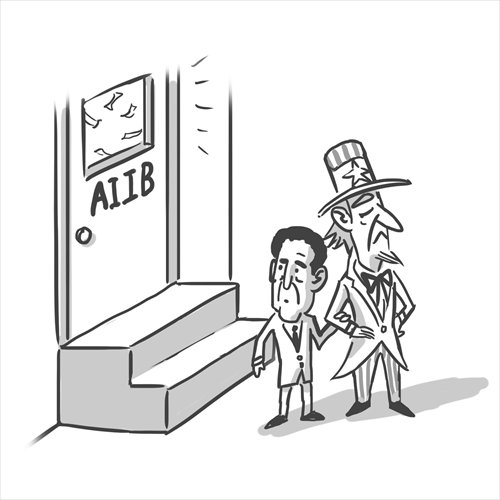


Illustration: Liu Rui/GT
In mid-March, the UK took the lead in announcing its decision to participate in the Asian Infrastructure Investment Bank (AIIB), followed by others European countries such as Germany, France and Italy. Japan and Europe are increasingly divergent on joining the AIIB.
When Japanese Deputy Prime Minister and Finance Minister Taro Aso met with Indian Prime Minister Narendra Modi last September, he underlined that the AIIB's assessment mechanism failed to fully comply with international criteria. He asked Modi, "Can the AIIB account for a project's environmental impact during the evaluation process?"
Aso urged New Delhi to dismiss the idea to join the AIIB. However, just two months later, India signed a memorandum for the creation of the new multilateral bank. Since then, developed countries have started considering joining the AIIB, making it incrementally difficult for Washington and Tokyo to maintain their dominance over Asian development finance.
The creation of the AIIB has been partly pushed by the US and Japan. China has been seeking a larger interest in the Asian Development Bank (ADB) but was turned down by the top two donors.
Tokyo has been shunning the AIIB because it thinks that no "fair" operations can be expected from Beijing's leading position in the bank. It worries that the AIIB will likely become a huge bank for China's export and import and the financial policies formulated by the World Bank and the ADB will be swayed. With more developed countries becoming founding members of the bank, the dominant power of development finance in Asia will shift.
Japan also argues that the AIIB lacks attention to environmental protection, fundraising and financial sustainability, which may lead to a financial or a credit crisis in a short term. Last but not least, the US is quite prudent toward the AIIB and its close ally Japan has been acting as a loyal parrot.
The domino effect Washington has been worrying about has occurred. Once other G7 members announce plans to sign up for the AIIB, Japan will face a tough scenario. The government of Shinzo Abe will be confronted with increasing pressure from public opinion and many Japanese scholars and officials expect Tokyo to participate in the AIIB soon. Therefore, Abe's cabinet has to gradually change their attitude toward the bank.
According to Chinese Finance Minister Lou Jiwei, the AIIB complements existing multilateral development banks and China will actively promote cooperation with the World Bank and the ADB in myriad spheres.
The AIIB will draw experience from the existing banks in governance structure, environment and social security policies and meanwhile circumvent existing obstacles in order to lower costs and improve efficiency.
This bank is an open and accommodating multilateral development institution and welcomes all countries with an interest. And the participation of major European powers shows that the AIIB is not a "tool" of China.
Japan has keenly felt the pressure from China's increasing military and economic strength in recent years, which could explain why it has become the last big Asian power left boycotting the AIIB. However, Tokyo admits that infrastructure is a prerequisite for national economic development and the ADB is unable to provide the needed funding. Focusing on investment in Asia's infrastructure development, the AIIB will offer enormous financial support for the growth of all Asian nations, which will inevitably bring huge business opportunities.
The AIIB is due to begin operations by the end of 2015. The AIIB needs to learn from the successful experiences of international multilateral financial institutions such as the World Bank to avoid past mistakes and become a high-ranking bank.
China, as the AIIB's initiator and headquarter, should support it through self-improvement. This will also boost China's social development as a whole.
Japan's rejection of the AIIB is not a rational choice. It means it has given up some development opportunities. The joint objections by both the US and Japan will only taint their self-proclaimed leadership in international cooperation.
The author is a professor at the School of International Studies at Yunnan University.
 J-11 fighters in air exercise
J-11 fighters in air exercise Beauties dancing on the rings
Beauties dancing on the rings Attendants-to-be join Mr. & Miss Campus Contest
Attendants-to-be join Mr. & Miss Campus Contest Beijing's toughest anti-smoking law takes effect
Beijing's toughest anti-smoking law takes effect Family lives in cave for about 50 years in SW China
Family lives in cave for about 50 years in SW China PLA soldiers operating vehicle-mounted guns in drill
PLA soldiers operating vehicle-mounted guns in drill Blind carpenter in E China's Jiangxi
Blind carpenter in E China's Jiangxi China hosts overseas disaster relief exercise for the first time
China hosts overseas disaster relief exercise for the first time 20 pairs of twins who will become flight attendants in Sichuan
20 pairs of twins who will become flight attendants in Sichuan Obama is sowing discontent in S.China Sea
Obama is sowing discontent in S.China Sea Rescuers work through night to reach cruise ship survivors
Rescuers work through night to reach cruise ship survivors Driving through limbo
Driving through limbo Facing down MERS
Facing down MERSDay|Week